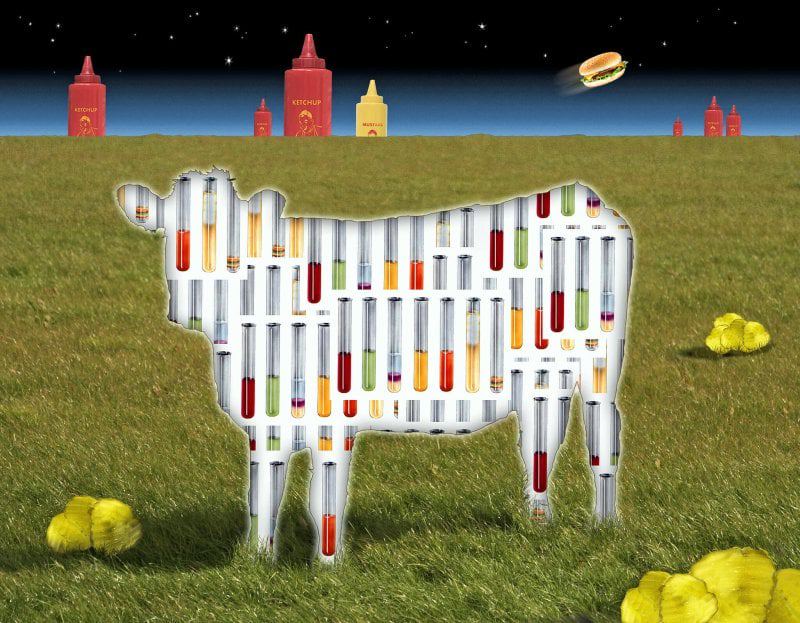Future of food: Cell-based protein key to ensure sustainability of our global food supply
Future of food: Cell-based protein key to ensure sustainability of our global food supply


A 2018 meta-analysis estimated that food production releases more than one-quarter of all human-caused greenhouse gases and that agricultural irrigation accounts for about two-thirds of all fresh water used by humans.1
The same report estimates that 37% of the planet’s land area is already dedicated to food production and, according to the United Nations Food and Agriculture Organization, just 7% of our fisheries are “underexploited”.
This shows how scarce the planet’s resources already are and how little opportunity there is to scale up our seafood production using current methods.
There are many potential solutions, says [food science professor David Julian McClements], from gene editing to improve crop yield and resilience, to using robots, automation and artificial intelligence to increase supply chain efficiencies.
But one of the unavoidable truths is that our current and future consumption of animal-source proteins is simply unsustainable. That’s why researchers like McClements are working to design alternatives to animal-based foods that taste and can be cooked the same way, but that are beneficial for the environment and our health.
“It’s a very exciting area to be working in at the moment,” agrees McClements. “I’ve never had so many students who want to work in the lab because everyone’s really passionate about these plant-based foods and using them to try and improve the health of people and the sustainability of the environment.”
This is an excerpt. Read the original post here.

 | Videos | More... |

Video: Nuclear energy will destroy us? Global warming is an existential threat? Chemicals are massacring bees? Donate to the Green Industrial Complex!
 | Bees & Pollinators | More... |

GLP podcast: Science journalism is a mess. Here’s how to fix it

Mosquito massacre: Can we safely tackle malaria with a CRISPR gene drive?

Are we facing an ‘Insect Apocalypse’ caused by ‘intensive, industrial’ farming and agricultural chemicals? The media say yes; Science says ‘no’
 | Infographics | More... |

Infographic: Global regulatory and health research agencies on whether glyphosate causes cancer
 | GMO FAQs | More... |

Why is there controversy over GMO foods but not GMO drugs?

How are GMOs labeled around the world?

How does genetic engineering differ from conventional breeding?
 | GLP Profiles | More... |

Alex Jones: Right-wing conspiracy theorist stokes fear of GMOs, pesticides to sell ‘health supplements’




 Viewpoint — Fact checking MAHA mythmakers: How wellness influencers and RFK, Jr. undermine American science and health
Viewpoint — Fact checking MAHA mythmakers: How wellness influencers and RFK, Jr. undermine American science and health Viewpoint: Video — Big Solar is gobbling up productive agricultural land and hurting farmers yet providing little energy or sustainabilty gains
Viewpoint: Video — Big Solar is gobbling up productive agricultural land and hurting farmers yet providing little energy or sustainabilty gains Fighting deforestation with CO2: Biotechnology breakthrough creates sustainable palm oil alternative for cosmetics
Fighting deforestation with CO2: Biotechnology breakthrough creates sustainable palm oil alternative for cosmetics Trust issues: What happens when therapists use ChatGPT?
Trust issues: What happens when therapists use ChatGPT? California, Washington, Oregon forge immunization alliance to safeguard vaccine access against federal undermining
California, Washington, Oregon forge immunization alliance to safeguard vaccine access against federal undermining 30-year-old tomato line shows genetic resistance to devastating virus
30-year-old tomato line shows genetic resistance to devastating virus The free-range chicken dilemma: Better for birds, but with substantial costs
The free-range chicken dilemma: Better for birds, but with substantial costs ‘You have to treat the brain first’: Rethinking chronic pain with Sanjay Gupta
‘You have to treat the brain first’: Rethinking chronic pain with Sanjay Gupta
